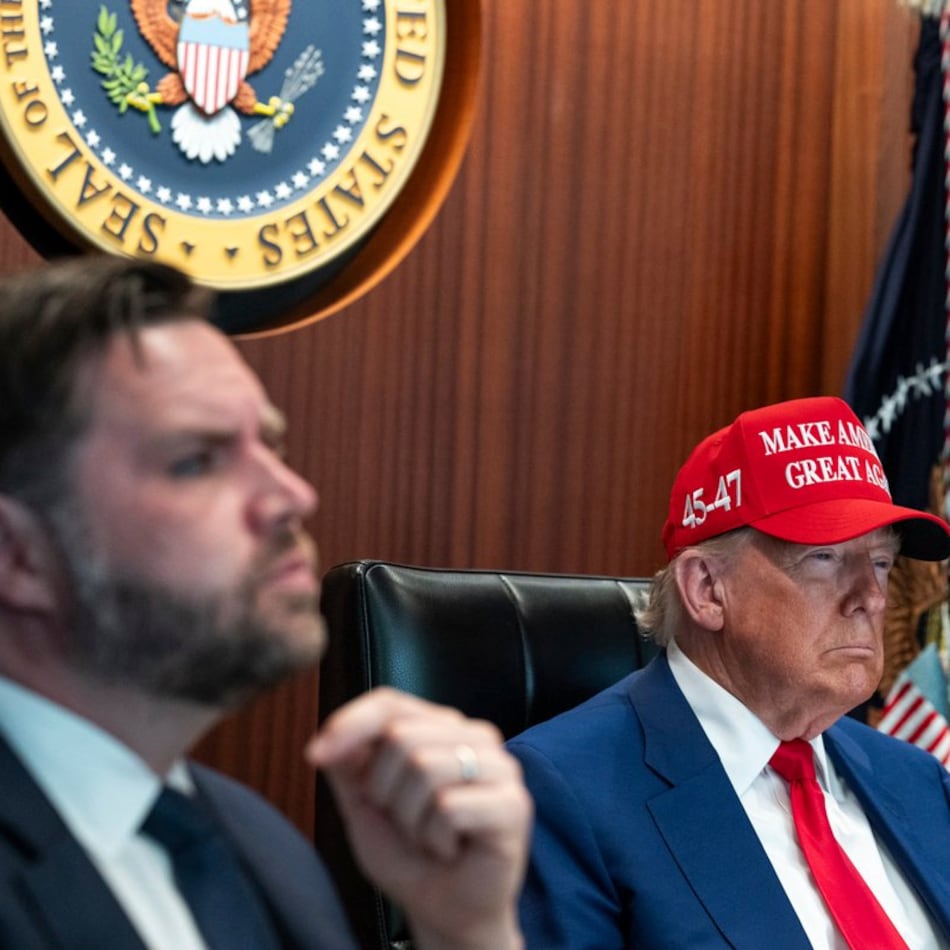WASHINGTON (AP) — President Donald Trump's decision to launch a military strike on Iran's nuclear sites without fully consulting the U.S. Congress layered a partisan approach onto a risky action, particularly because the White House briefed top Republican leaders beforehand while leaving Democrats with little information.
While House Speaker Mike Johnson, Senate Republican leader John Thune and the GOP chairman of the Senate Intelligence Committee all were briefed before the action, their counterparts were not. Senate Democratic leader Chuck Schumer was given a perfunctory heads-up by the White House shortly before the strikes were made public. And House Democratic leader Hakeem Jeffries' office received a "courtesy call" before Trump announced it. The so-called Gang of Eight congressional and intelligence leaders were not notified before the mission, according to two people familiar with the situation and granted anonymity to discuss it.
One, Rep. Jim Himes, the top Democrat on the House Intelligence Committee, said he learned of the strikes on social media, which he said “is an uncomfortable thing for the ranking member of the Intelligence Committee.”
“Bad enough that we weren’t informed,” Himes, of Connecticut, said Sunday on CNN, "but unconstitutional that we didn’t have the opportunity to debate and speak, as the representatives of the people, on what is one of the more consequential foreign policy things that this country has done in a long time.”
It's a highly unusual situation that is complicating the difficult politics ahead for the president and his party as the U.S. enters an uncertain national security era with the surprise military attack on the nuclear facilities, an unprecedented incursion in Iran.
Trump faces a vote in Congress as soon as this week on a war powers resolution from Sen. Tim Kaine, D-Va., that would "direct the removal of United States Armed Forces from hostilities against the Islamic Republic of Iran that have not been authorized by Congress." Another resolution has been introduced by lawmakers from both parties in the U.S. House. And at least one Democrat, Rep. Alexandria Ocasio Cortez, said Trump's actions are "clearly grounds for impeachment."
At the same time, the Trump administration is expecting Congress to send an additional $350 billion in national security funds as part of the president's big tax breaks bill also heading soon for a vote. Senators are set to be briefed Tuesday behind closed doors on the situation in Iran.
White House press secretary Karoline Leavitt said Sunday that the White House made “bipartisan courtesy calls” to congressional leadership. She said in a social media post that the White House spoke to Schumer “before the strike” but that House leader Jeffries “could not be reached until after, but he was briefed.”
While the president has authority as the commander in chief of the U.S. armed forces to order specific military actions, any prolonged war-time footing would traditionally need authorization from Congress. The House and Senate authorized actions in Iraq, Afghanistan and beyond after the Sept. 11, 2001, attack.
“Congress should be consulted,” Kaine said on CBS’ “Face the Nation.” “We were not.”
As soon as Trump announced the actions late Saturday, he won swift support from the GOP leadership in Congress. Johnson, Thune and the Senate Intelligence Committee chairman, Sen. Tom Cotton of Arkansas, were all briefed ahead of time and sent almost simultaneous statements backing the military campaign, as did the House Intelligence Committee chairman, Rep. Rick Crawford, also of Arkansas.
But by apparently engaging with only one side of the political aisle, Trump risks saddling his Republican Party with political ownership of the military action against Iran, which may or may not prove popular with Americans. Rather than rally the country to his side, Trump risks cleaving its already deep divisions over his second term agenda.
Johnson, who praised Trump's action against Iran as “the right call,” said the president's targeted strike was within his authority and in line with past presidential actions.
“Leaders in Congress were aware of the urgency of this situation and the Commander-in-Chief evaluated that the imminent danger outweighed the time it would take for Congress to act,” Johnson, R-La., said on social media.
Trump himself has shown little patience for political dissent from within his party, even as criticism rolls in from among his most trusted backers.
The Iran military campaign threatens to splinter Trump's Make America Great Again movement, which powered his return to the White House. Many Trump supporters aligned with his campaign promises not to involve the United States in overseas actions and instead to be a peace-making president.
“I think I represent part of the coalition that elected Trump,” said Rep. Thomas Massie, R-Ky., on CBS. “We were tired of endless wars in the Middle East.”
Massie and Democratic Rep. Ro Khanna of California have introduced their own war powers resolution in the House, a sign of how close the far left and far right have bonded over their opposition to U.S. campaigns abroad, particularly in the Middle East.
The Trump administration insisted Sunday the U.S. is not seeking a war with Iran. “We’re not at war with Iran. We’re at war with Iran’s nuclear program,” said Vice President JD Vance on NBC’s “Meet the Press.”
And Trump swiftly attacked Massie, who is one of the most steadfast non-interventionist GOP lawmakers in Congress — along with Sen. Rand Paul, also of Kentucky — and the president suggested he would turn his Republican Party against the congressman.
“MAGA should drop this pathetic LOSER, Tom Massie, like the plague!" the president said on social media. "The good news is that we will have a wonderful American Patriot running against him in the Republican Primary, and I’ll be out in Kentucky campaigning really hard.”
__
Associated Press writer Mary Clare Jalonick contributed to this report.
Credit: AP
Credit: AP
Credit: AP
Credit: AP
Keep Reading
The Latest
Featured





